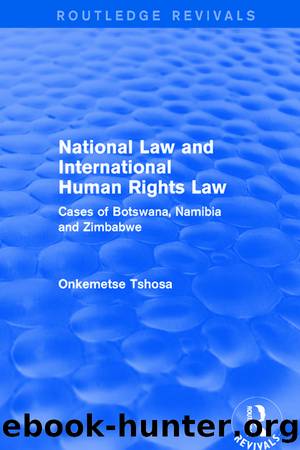National Law and International Human Rights Law by Onkemetse Tshosa

Author:Onkemetse Tshosa [Tshosa, Onkemetse]
Language: eng
Format: epub
Tags: Social Science, General, Sociology
ISBN: 9781351759038
Google: dzcrDwAAQBAJ
Publisher: Taylor & Francis
Published: 2017-07-05T03:25:56+00:00
Personal Liberty
Personal liberty in Botswana is recognised and protected by Section 5(1) of the Constitution. This provision declares that âno person shall be deprived of his personal liberty save as may be authorised by law.â Section 5(1) corresponds to Article 6 of the ACHPR, Article 3 of the UDHR and Article 9(1) of the ICCPR except that it does not also protect security of person. Moreover, unlike the international human rights instruments, the Botswana clause does not protect this freedom positively. It adopts a negativist approach. Nevertheless, it incorporates, both in form and content, the basic international standards for the safeguard of personal liberty. It extends procedural fairness and guarantees to the individual in ordinary criminal process. It encompasses freedom from arbitrary arrest and detention. This clause safeguards individual physical liberty.15
The Constitution of Botswana, as with international instruments,16 does not guarantee the right to liberty in absolute terms. It recognises executive powers of the State to deprive the individual of his liberty, for instance, in execution of the lawful sentence of the court, on reasonable suspicion of a person having committed an offence and to protect the rights of others or the society.17 However, its deprivation must be authorised by law. This means that it is not the deprivation of liberty in and of itself that is objectionable but rather that which is arbitrary and unlawful.
It is in this vein that Section 5(2) of the Constitution provides that an individual whose right to personal liberty is threatened or who is arrested or detained should be informed as soon as practicable, in the language that he understands, of the reasons of his arrest or detention. In paragraph 3, any person who is arrested or detained on reasonable suspicion of having committed an offence should be brought as soon as is reasonably practicable before court usually within forty-eight hours. If he is not tried within a reasonable time, he shall be released unconditionally or upon reasonable conditions to ensure that he appears at a later date for trial. These safeguards guarantee the right of habeas corpus. They correspond to Article 5(2) to (5) of the ECHR. They are designed to ensure legality when this freedom is curtailed. In practice, these safeguards are generally respected by government authorities.18
The most controversial issue concerns arrest or detention by police officers on reasonable suspicion of the person having committed an offence. Generally, police officers have powers to arrest any person on reasonable suspicion or grounds of having committed a crime.19 The question that emerges is, what amounts to reasonable grounds or suspicion that a person has committed a crime? Or, what is the test of reasonableness in these cases? This issue was a point of contention in Oakametse v. Attorney-General and Another.20 The applicant was arrested by the Police in Serowe in the Central Administrative District on allegations that she called the complainant a witch. She was detained. She challenged her detention in the High Court on the basis of Section 5(2) of the Constitution. The
Download
This site does not store any files on its server. We only index and link to content provided by other sites. Please contact the content providers to delete copyright contents if any and email us, we'll remove relevant links or contents immediately.
The Burglary by Betty Medsger(622)
Narrative of the Life of Frederick Douglass, an American Slave Incidents in the Life of a Slave Girl by Harriet Jacobs Frederick Douglass(504)
With Liberty and Justice for Some by Glenn Greenwald(481)
Policing the Planet: Why the Policing Crisis Led to Black Lives Matter by Jordan T. Camp(468)
Free Speech: A Very Short Introduction (Very Short Introductions) by Warburton Nigel(387)
Tribes and Tribulations by Unknown(354)
Emotional Intelligence: The Most Complete Blueprint to Develop And Boost Your EQ. Improve Your Social Skills, Emotional Agility and Discover Why it Can Matter More Than IQ. (EQ Mastery 2.0) by Glenn Cummings(333)
Open Season by Ben Crump(331)
Why Marriage Matters by Evan Wolfson(331)
Freedom Riders by Arsenault Raymond;(327)
When Islam Is Not a Religion by Asma T. Uddin(318)
Brokered Subjects by Elizabeth Bernstein(316)
Handbook for a Post-Roe America by Robin Marty(279)
Race and Restoration by Barclay Key(255)
Networked Press Freedom by Ananny Mike;(253)
Anatomy of Innocence by Laura Caldwell(243)
Abigail Scott Duniway and Susan B. Anthony in Oregon by Jennifer Chambers(231)
What's Wrong with Rights? by Radha D'Souza(180)
National Law and International Human Rights Law by Onkemetse Tshosa(176)
